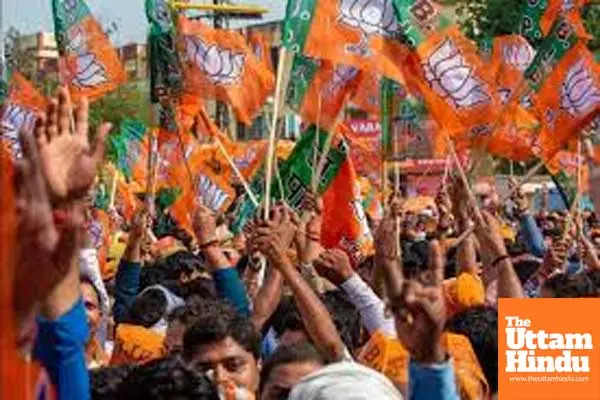
BJP Slams Congress Govt's Holi Guidelines as Ramadan Visibility Raises Eyebrows

Uttar Pradesh (The Uttam Hindu) : The ongoing debate between the ruling Bharatiya Janata Party (BJP) and the Congress party intensified after the Congress-led government issued its controversial Holi guidelines, which have been slammed by the BJP. The row has grown more heated with the added complexity of Ramadan, with BJP leaders accusing the Congress government of not addressing the concerns of the Muslim community, especially during the holy month of Ramadan.
Details of the Controversy:
On the eve of Holi, the Congress government in power released a set of guidelines for the celebration of the festival, which they claimed were aimed at ensuring public safety and maintaining order during the festivities. However, BJP leaders have expressed strong dissatisfaction with the guidelines, alleging that the government’s actions are politically motivated and intended to curb the traditional spirit of the festival.
While Holi is widely celebrated across India, the timing of this year's festivities coincides with the month of Ramadan, a time of fasting and spiritual reflection for Muslims. BJP spokespersons have pointed out the “lack of visibility” of Ramadan-specific accommodations in the government’s approach. According to BJP leaders, the guidelines appear to favor the celebrations of Holi while ignoring the sensitivities of the Muslim community, who are observing a month of fasting from sunrise to sunset.
BJP’s Criticism:
The BJP has particularly taken issue with the fact that the Congress government has not acknowledged the potential disruptions Holi celebrations could cause to those fasting for Ramadan. Senior BJP leader Ravi Shankar Prasad remarked, “It seems that the Congress government is focusing on Holi without considering the importance of Ramadan. While they are quick to impose guidelines for a Hindu festival, they fail to show similar concern for a Muslim community that is observing a period of religious observance.”
Another BJP spokesperson, Shahnawaz Hussain, further criticized the Congress government, stating, “Why are the guidelines for Holi being enforced without considering the needs of the Muslim community during Ramadan? This selective approach is deeply unfair, and it highlights the Congress party’s disregard for the sensitivities of minorities in India.”
Congress Responds:
In response, Congress leaders have defended their guidelines as necessary for ensuring the safety and security of the public during Holi. A senior Congress spokesperson claimed that the guidelines were issued after consulting various stakeholders and that they were in no way intended to undermine the observance of Ramadan. “The Congress government is committed to the welfare of all communities in India,” the spokesperson said. “Our guidelines are intended to protect public health and maintain law and order. We have taken all necessary steps to ensure that the celebrations are carried out in an organized manner.” However, Congress has remained silent on the accusations that the party has not made accommodations for the Muslim community during Ramadan, leading to further friction between the two political parties.
The Bigger Picture:
This issue has sparked a broader debate about religious sensitivity and political agendas in India. The BJP has accused the Congress of being insincere in its approach to religious harmony, while the Congress maintains that its actions are in line with its responsibility to govern all communities fairly. The timing of the controversy, in the middle of significant religious observances for both Hindus and Muslims, has only added fuel to the fire. As India’s political landscape continues to be shaped by religious and cultural divisions, this clash between the BJP and Congress highlights the complexities of balancing political power with the sensitivities of diverse religious communities.
The row between the BJP and Congress over the Holi guidelines and the perceived neglect of Ramadan has brought religious and political tensions to the forefront of national discourse. As both parties trade accusations, the issue underscores the delicate balance that governments must strike in a multi-religious society like India. With elections on the horizon, this controversy is likely to resonate with voters, especially those who feel their religious practices are being overlooked or politicized. As the situation unfolds, it remains to be seen whether the Congress government will revise its guidelines to address the concerns raised by the BJP or whether this will become a central issue in the upcoming elections.

